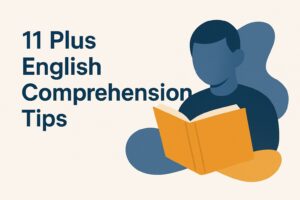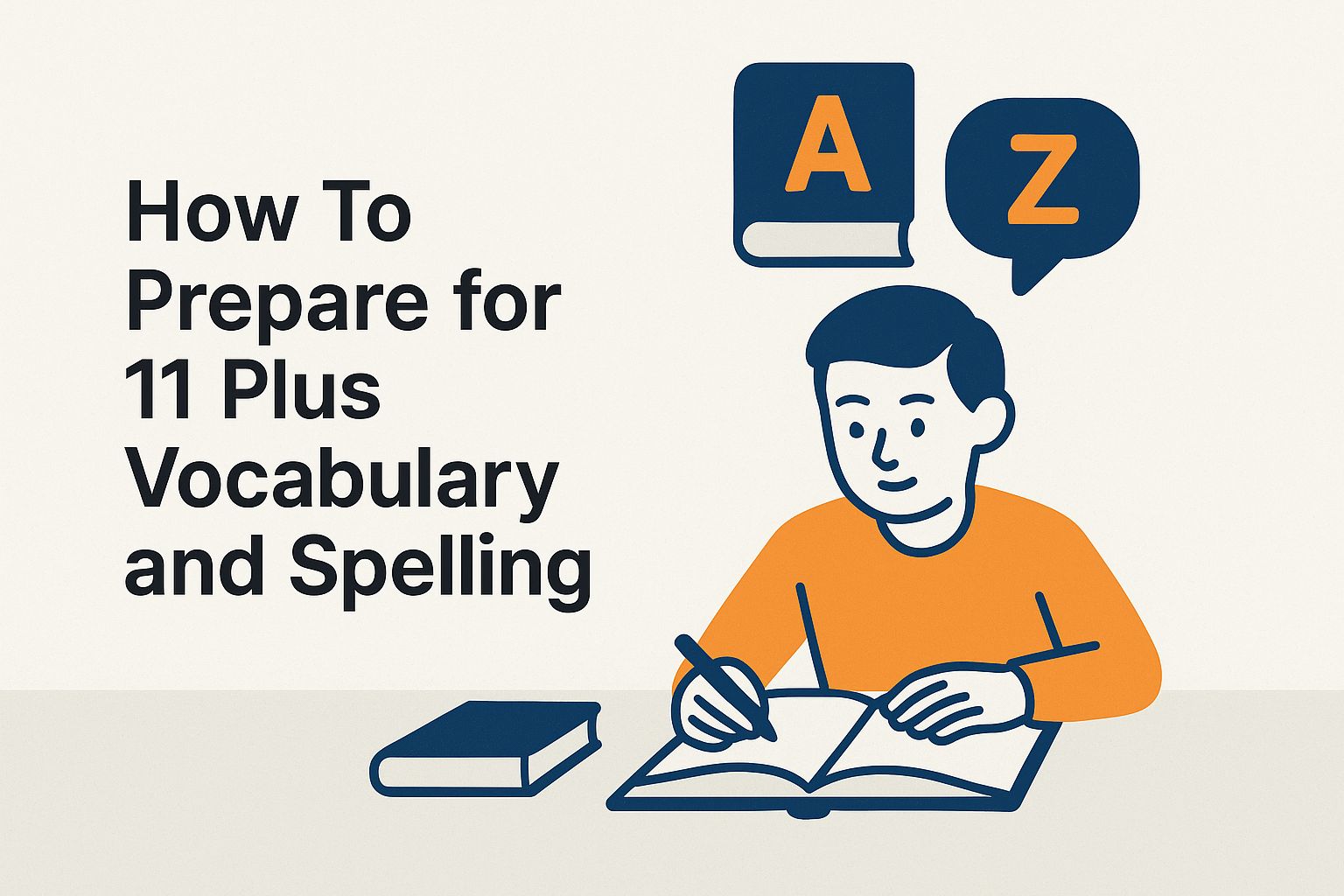
How To Prepare for 11 Plus Vocabulary and Spelling
Unlocking the secrets to mastering the 11 Plus exam can feel like a daunting task, especially when it comes to 11 Plus Vocabulary and Spelling. These skills are crucial not just for passing the test but also for building a strong foundation in communication.
In this guide, we’ll dive into effective strategies for assessing your current level, building a robust vocabulary, and honing your spelling skills. Get ready to transform your preparation into an exciting journey that boosts your confidence and readiness for the big day!
Understanding the Importance of Vocabulary
A strong vocabulary is crucial for achieving high levels of comprehension and communication skills in the 11 Plus exam. Students who possess an extensive vocabulary tend to perform better not only in reading comprehension tests but also in their writing pursuits.
Research indicates that mastering at least 2,000 words can enhance reading comprehension scores by as much as 30%. To build vocabulary, it is beneficial to encourage daily reading of diverse materials, including classic literature, newspapers, and educational websites.
Utilising tools such as vocabulary apps like Quizlet or Vocabulary.com can further reinforce learning through engaging and interactive practice. Consistent exposure to and use of new words in context significantly enhances retention and application during examinations.
Why Spelling Matters in the 11 Plus Exam
Spelling accuracy plays a crucial role in performance in the 11 Plus exam, accounting for as much as 20% of the total score in the English section. Common spelling errors, such as confusing ‘their‘ with ‘there‘ or ‘your‘ with ‘you’re,’ can result in unnecessary point deductions.
To reduce these mistakes, students should engage in regular practice using tools like SpellingCity or Quizlet, which provide interactive spelling games and flashcards. Additionally, writing exercises that promote self-editing can be quite beneficial.
For instance, students can review their written work, highlight words they find challenging, and allocate time to master these through repeated writing and recitation. This proactive approach not only enhances performance in the exam but also contributes to the development of overall writing skills.
Assessing Current Vocabulary and Spelling Level
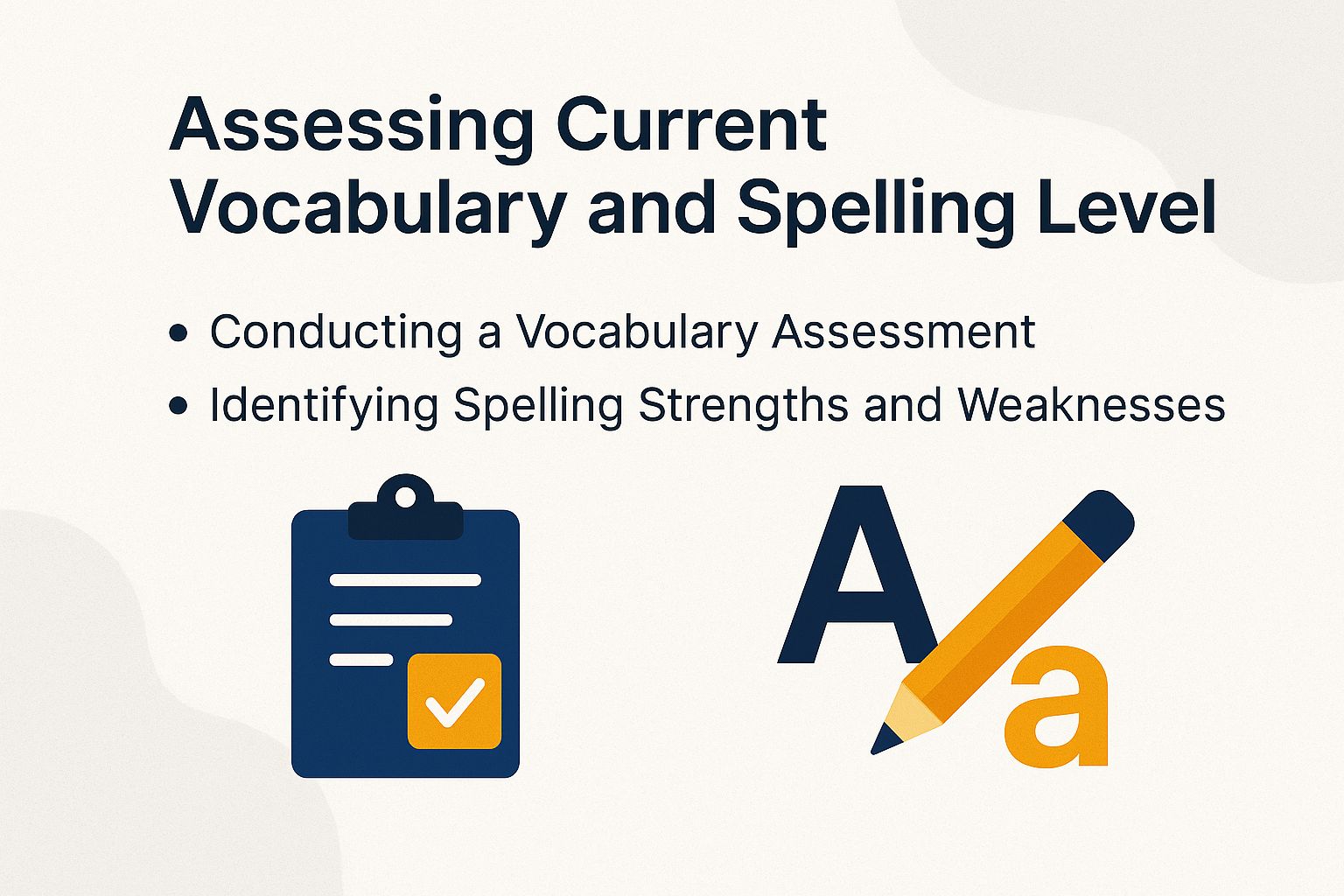
Assessing one’s current vocabulary and spelling levels establishes a foundation for developing targeted improvement strategies specifically designed for the 11 Plus examination.
Conducting a Vocabulary Assessment
It is advisable to utilise free online tools such as Quizlet or Vocabulary.com to conduct a comprehensive vocabulary assessment for 11 Plus candidates. Start by administering vocabulary quizzes on these platforms, which offer a variety of question formats to effectively gauge comprehension.
For example, on Quizlet, you have the option to create flashcards that concentrate on synonyms and antonyms, while Vocabulary.com provides adaptive quizzes that adjust their difficulty based on the candidate’s performance.
Once you have gathered the results, take the time to analyse the common errors and identify any vocabulary gaps. This information will enable you to create a personalised study plan that emphasises specific types of words, such as academic vocabulary or subject-related terms, ultimately enhancing the candidate’s preparedness for the exam.
Identifying Spelling Strengths and Weaknesses
A targeted spelling assessment can effectively identify specific areas of strength and weakness, allowing for focused practice on challenging words. To implement an effective spelling assessment, one can utilise resources like SpellingCity.com, which offers interactive quizzes tailored to the learner’s level.
Begin by creating a custom list of words that are relevant to the curriculum or commonly misspelt. After administering the assessment, analyse the results to uncover recurring challenges, such as confusion between homophones or issues with common suffixes.
Incorporate targeted practice by taking advantage of the various games and activities available on the site, making the learning process enjoyable. Conducting regular assessments every few weeks can help track progress and refine the overall learning strategy.
Building Vocabulary for the 11 Plus
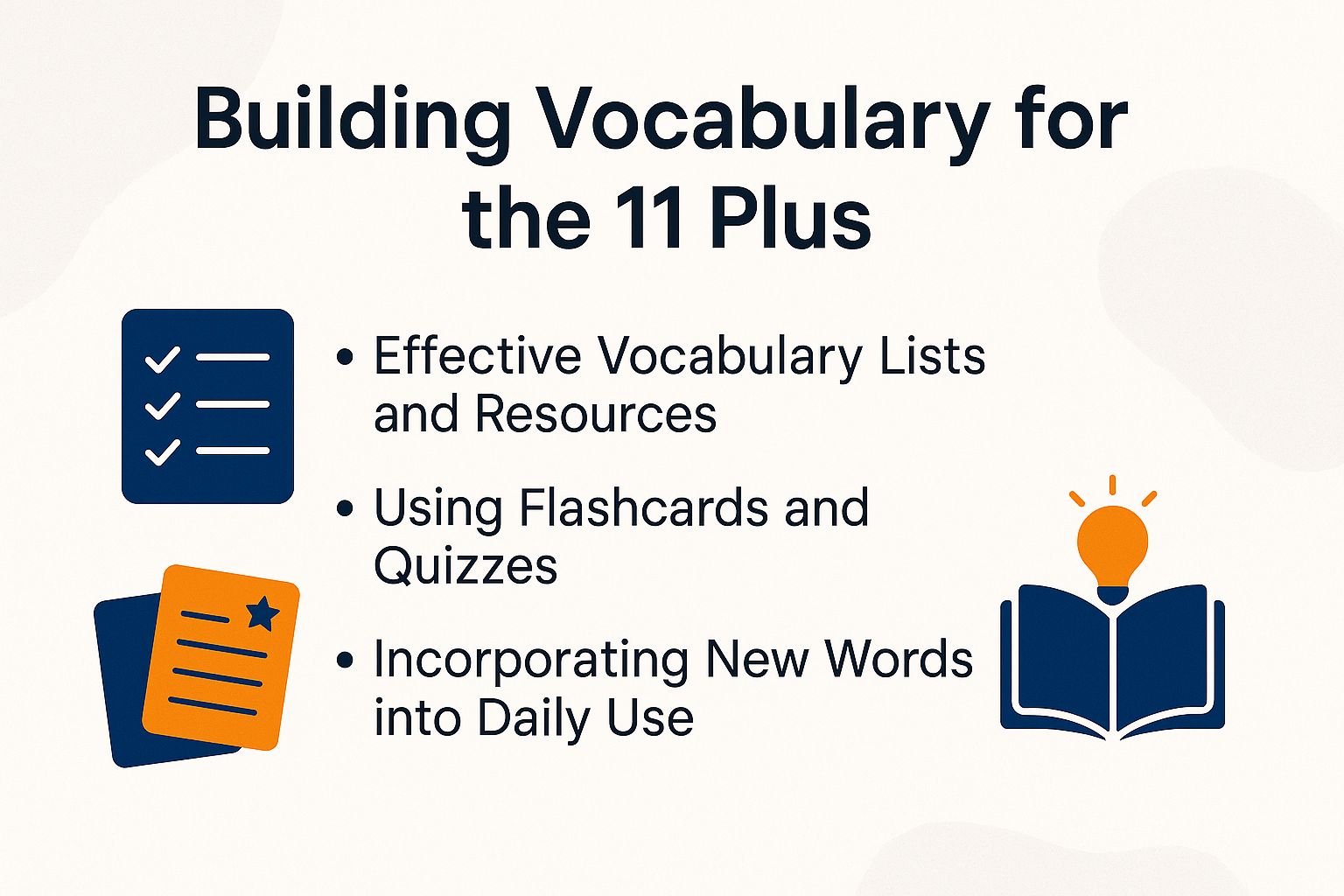
Establishing a strong vocabulary foundation is crucial for achieving success in the 11 Plus. This requires the implementation of structured strategies and the utilisation of effective resources.
Effective Vocabulary Lists and Resources
Utilising curated vocabulary lists specifically designed for the 11 Plus, such as the ‘11 Plus Vocabulary Book,’ can significantly enhance one’s word knowledge in a systematic manner.
Additional effective resources include ‘Vocabulary University,’ which provides interactive exercises tailored to meet 11 Plus standards, as well as the ’11 Plus Grammar School Interview Vocabulary Guide,’ which focuses on terms frequently encountered in examinations.
The app ‘Word Up!‘ gamifies the vocabulary-building process, making learning engaging for students. Another option is ‘Vocabulary.com,’ where students have the ability to create custom lists and track their progress.
By combining these resources, students can develop a comprehensive approach to vocabulary enhancement that aligns well with the expectations of the 11 Plus syllabus.
Using Flashcards and Quizzes
Flashcards can significantly enhance vocabulary retention, and tools like Anki offer customisable platforms that facilitate learning through spaced repetition.
To create effective flashcard sets, it is important to focus on a few key methods.
- First, incorporating images and examples alongside terms can greatly improve recall. For instance, when learning the word “ubiquitous,” pairing it with a photo of a common object, such as a mobile phone, can be quite helpful.
- Organising your flashcards into themes—such as food, travel, and technology—provides a structured approach to learning.
- Additionally, utilising platforms like Quizlet allows for the creation of interactive quizzes, which fosters a more engaging review process.
By employing this combination of strategies, one can significantly enhance vocabulary retention.
Incorporating New Words into Daily Use
Regularly incorporating new vocabulary into your conversations and writing can greatly enhance your retention and familiarity with the words, which is vital for exam readiness. To effectively integrate new vocabulary, consider practising with the following exercises:
- Create flashcards with the word on one side and its definition along with an example sentence on the other. Make it a habit to review these daily.
- Engage in brief writing prompts that require you to use at least five new words to describe a personal experience or a fictional scenario.
- Join a conversation group or an online forum where you can intentionally apply these words in discussions, reinforcing their use in real-life situations.
Consistency in these practices can lead to significant improvements in your vocabulary retention.
Developing Spelling Skills
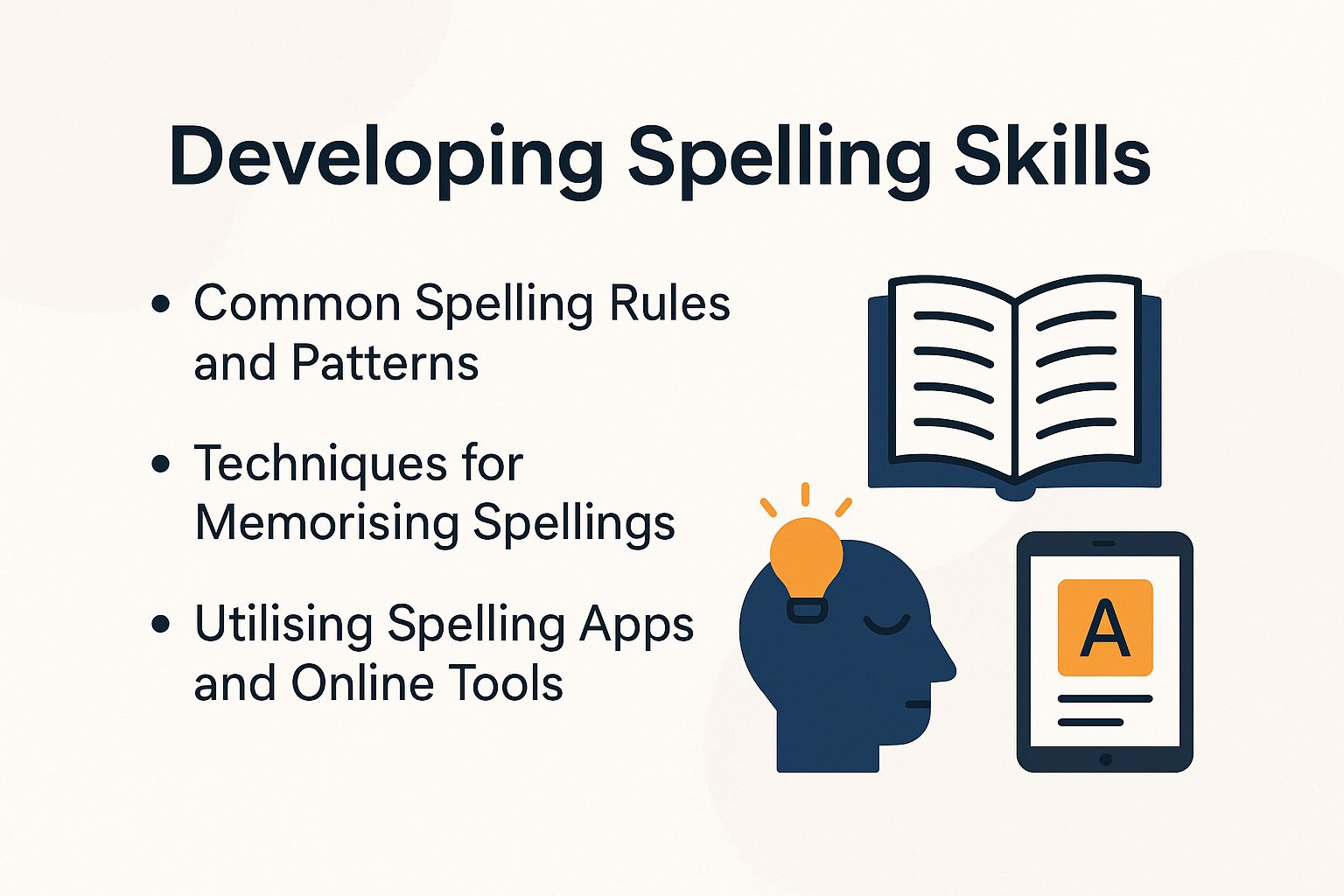
Enhancing spelling skills is crucial for success in the 11 Plus exam. It is important to concentrate on common spelling rules and to employ effective memorisation techniques. For a well-rounded preparation, consider the essential components outlined in our guide to creating a successful 11 Plus study plan.
Common Spelling Rules and Patterns
Understanding common spelling rules, such as “i before e except after c,” can significantly reduce spelling errors during exams.
Here are five key spelling rules to master, accompanied by actionable examples and practice words:
- “i before e except after c” – for example, believe and receive.
- Doubling consonants – such as running and setting (when adding endings).
- Dropping the final ‘e’ – for instance, making and larger (before a suffix).
- Changing ‘y’ to ‘i’ – like happily and tried (when adding endings).
- The ‘ck’ rule – as seen in back and thick (usually after a short vowel).
Practising these rules with words like thief, committed, and beautiful can enhance retention and improve overall spelling proficiency.
Techniques for Memorising Spellings
Utilising mnemonic devices and visual aids can greatly enhance spelling retention, making it easier to remember complex words.
One effective mnemonic strategy involves creating vivid associations. For instance, when trying to remember the word “necessary,” one might visualise a chef wearing one “collar” (represented by the letter ‘c’) and two “sleeves” (symbolised by the letters ‘s’).
Another helpful technique is to break down confusing words into smaller, more manageable parts. Take the word “accommodate,” for example; it can be thought of as “a common room,” where the two ‘c’s and two ‘m’s create extra space.
Additionally, using flashcards can be quite beneficial. By placing images or words on one side and their meanings on the other, individuals can reinforce their memory through both repetition and visualisation.
Utilising Spelling Apps and Online Tools
Applications such as Spelling City and Word Wizard offer interactive learning environments that transform the process of mastering spelling into an enjoyable and engaging experience.
Two noteworthy options include:
- Spelling City (free-£20): This app features games designed for various year groups, enabling students to practise spelling through enjoyable activities like spelling tests and word searches.
- Word Wizard (£4.99): This app is particularly well-suited for younger children, as it allows users to record their own voices while spelling words, reinforcing their learning through auditory feedback.
Both of these applications significantly enhance spelling skills while keeping students entertained, promoting a love for learning in a playful, gamified format.
Practice Strategies for Vocabulary and Spelling
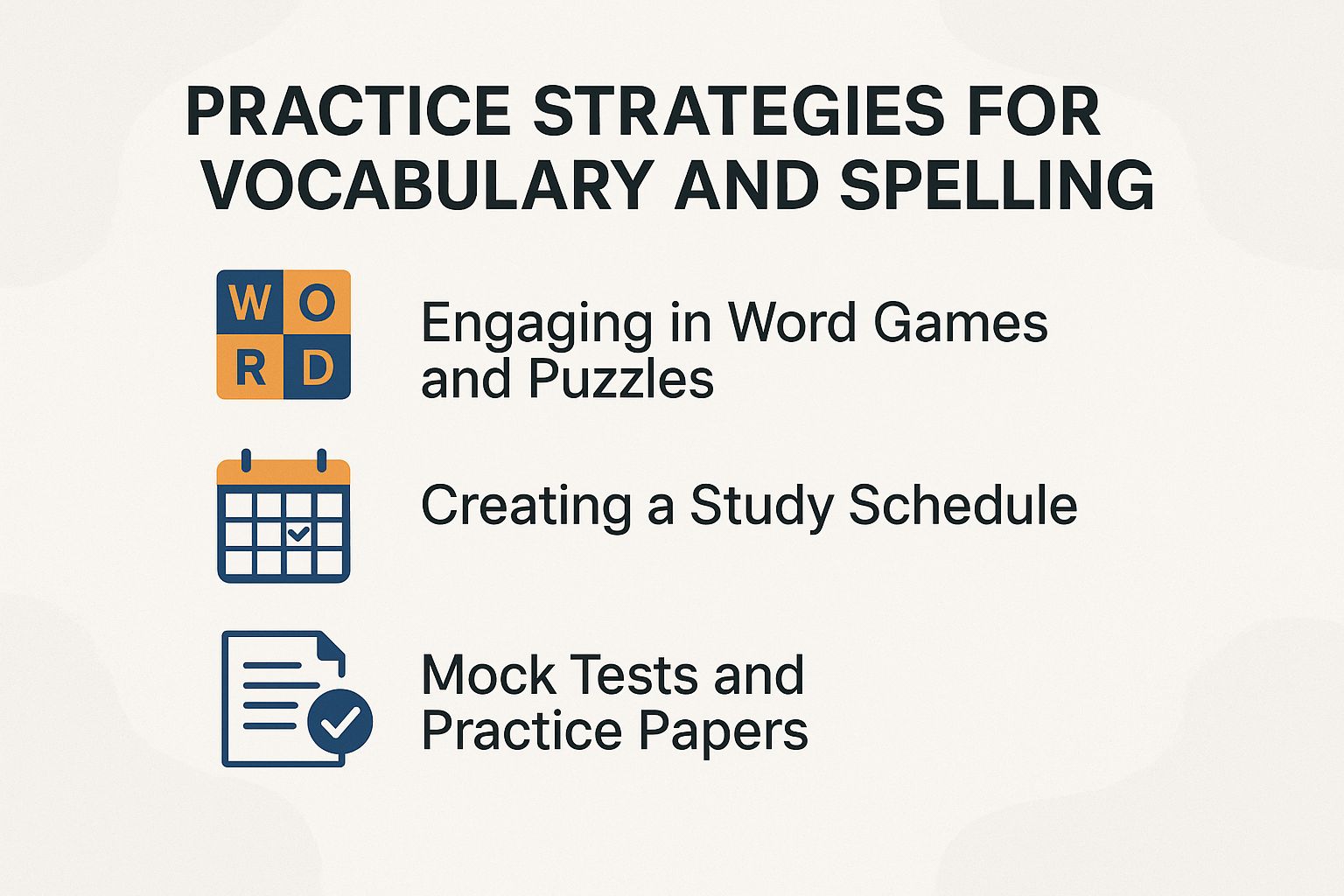
Utilising effective practice strategies for vocabulary and spelling can significantly improve retention and overall performance, particularly in preparation for important exams such as the 11 Plus. As your child prepares, consider exploring our expert insights on the 11+ entrance exams and Year 6 SATs to further enhance their readiness.
Engaging in Word Games and Puzzles
Incorporating word games, such as Scrabble or crossword puzzles, into study routines can enhance vocabulary and spelling skills while making the learning process enjoyable.
Here are five specific word games and puzzles that can effectively aid in vocabulary and spelling practice:
- Scrabble – This classic board game challenges players to create words for points, encouraging strategic thinking and creativity.
- Boggle – In this game, players search for words in a jumbled grid of letters, which enhances quick thinking and spelling ability.
- Hangman – A simple yet effective game that provides practice in spelling and deductive reasoning.
- Crossword Puzzles – These are excellent tools for expanding vocabulary through engaging clues.
- Word Search – While entertaining, they also reinforce word recognition skills.
Incorporating these games into your routine can lead to significant improvements in language skills.
Creating a Study Schedule
A well-organised study schedule can significantly enhance preparation time, allowing for a balanced approach to vocabulary and spelling practice as one approaches the 11 Plus exam.
To develop an effective weekly study plan, it is beneficial to allocate specific time blocks for each area of focus. For example, setting aside 30 minutes each day from Monday to Friday for vocabulary practice can be advantageous, particularly at the beginning of your study session when your mind is most alert.
On Saturdays, reserving an hour for spelling practice can provide an opportunity to review the vocabulary words learned throughout the week. Sundays can be dedicated to practice tests, where approximately 90 minutes can be spent simulating exam conditions.
This structured method not only aids in retention but also fosters crucial time management skills that are essential for success in the exam.
Mock Tests and Practice Papers
Taking regular mock tests is an excellent way to identify areas for improvement in vocabulary and spelling, ensuring one is well-prepared for the format of the 11 Plus exam.
To practise effectively, consider utilising resources such as 11plus.co.uk, which offers a range of mock tests specifically aligned with the syllabus. It is beneficial to focus on timed sections to closely simulate actual exam conditions, and to prioritise those areas where scores tend to be lower.
After completing each test, reviewing mistakes is crucial for understanding patterns—it’s important to determine whether errors stem from carelessness or gaps in knowledge. Additionally, incorporating tools like Quizlet for vocabulary and Spell Quiz for spelling can further elevate one’s preparation.
Aiming to take at least one full mock test each week leading up to the exam will provide a solid framework for success.
Incorporating Vocabulary and Spelling into Reading
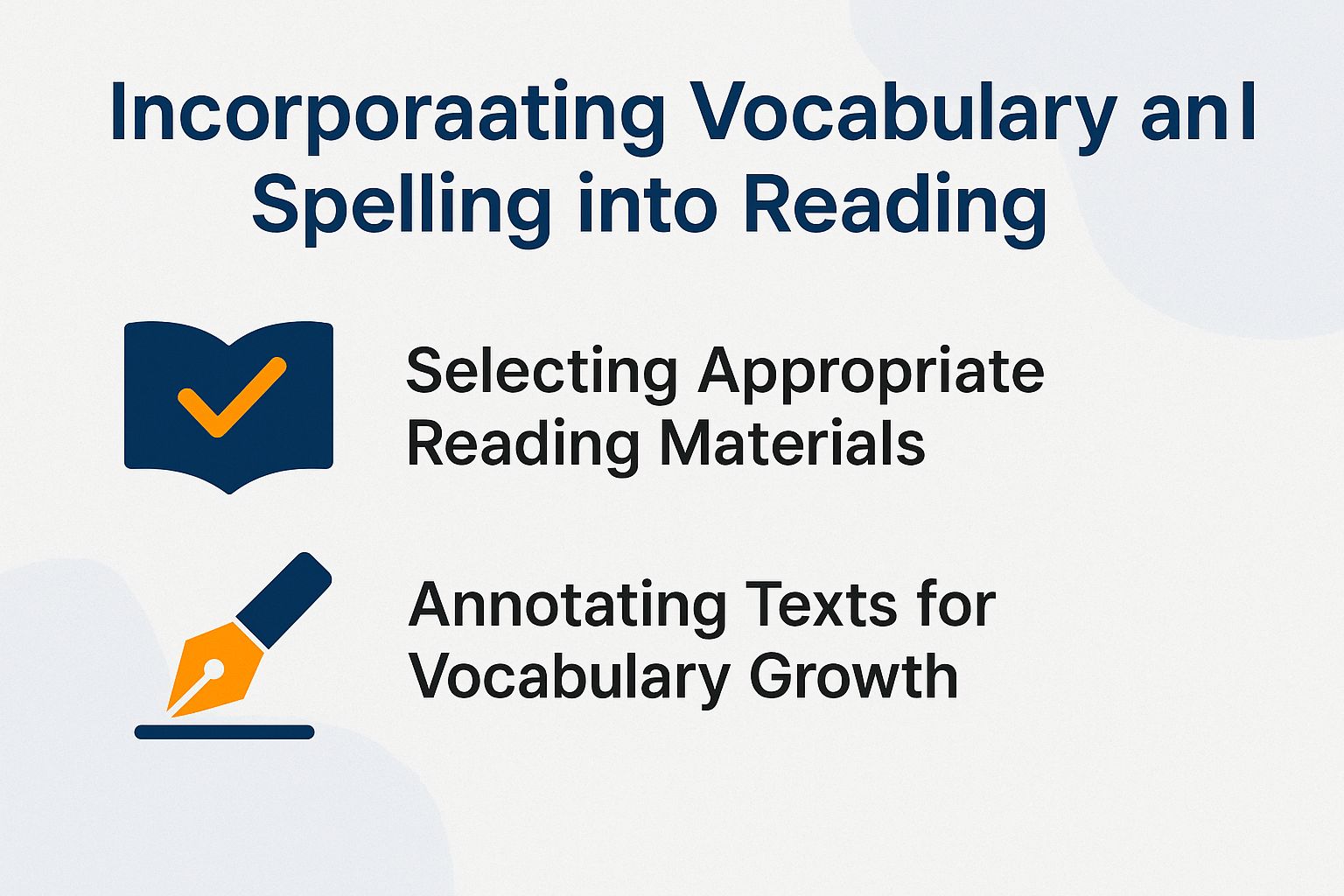
Integrating vocabulary and spelling practice into regular reading can significantly improve comprehension and retention of new words encountered in context.
When readers actively engage with the material, they are more likely to understand and remember the words they come across.
This approach not only enriches their vocabulary but also enhances their overall reading experience. For further guidance, see also how these strategies can be applied in preparing for 11+ Entrance Exams and Year 6 SATs, empowering parents to support their children’s learning journey.
Selecting Appropriate Reading Materials
Selecting age-appropriate and curriculum-relevant reading materials is an effective way to enhance vocabulary and spelling skills while making the learning process enjoyable.
For those preparing for the 11 Plus, consider incorporating these enriching titles into your reading list:
- ‘The Chronicles of Narnia’ by C.S. Lewis, which offers captivating fantasy elements.
- ‘Matilda’ by Roald Dahl, which introduces important themes of enablement and resilience.
- ‘Harry Potter and the Philosopher’s Stone’ by J.K. Rowling, known for its magical adventures and complex characters.
- ‘The Secret Garden’ by Frances Hodgson Burnett, which provides a timeless narrative centred on friendship and personal growth.
These books not only ignite interest but also assist in developing critical thinking and comprehension skills that are essential for success in the 11 Plus exam.
Annotating Texts for Vocabulary Growth
Annotating texts while reading promotes active engagement with new vocabulary, leading to improved retention and comprehension. To annotate effectively, several essential techniques can be employed.
- First, using highlighters to mark key terms can help them stand out visually. It is also beneficial to assign different colours for various categories, such as definitions or examples.
- Second, jotting down margin notes allows for summarising paragraphs or posing questions, which encourages deeper reflection on the material.
- Finally, creating a personal glossary at the back of your book or notebook dedicated to new vocabulary and spelling patterns encountered during readings can be quite helpful. This approach not only serves as a quick reference but also reinforces learning through repetition and review.
Review and Reinforcement Techniques
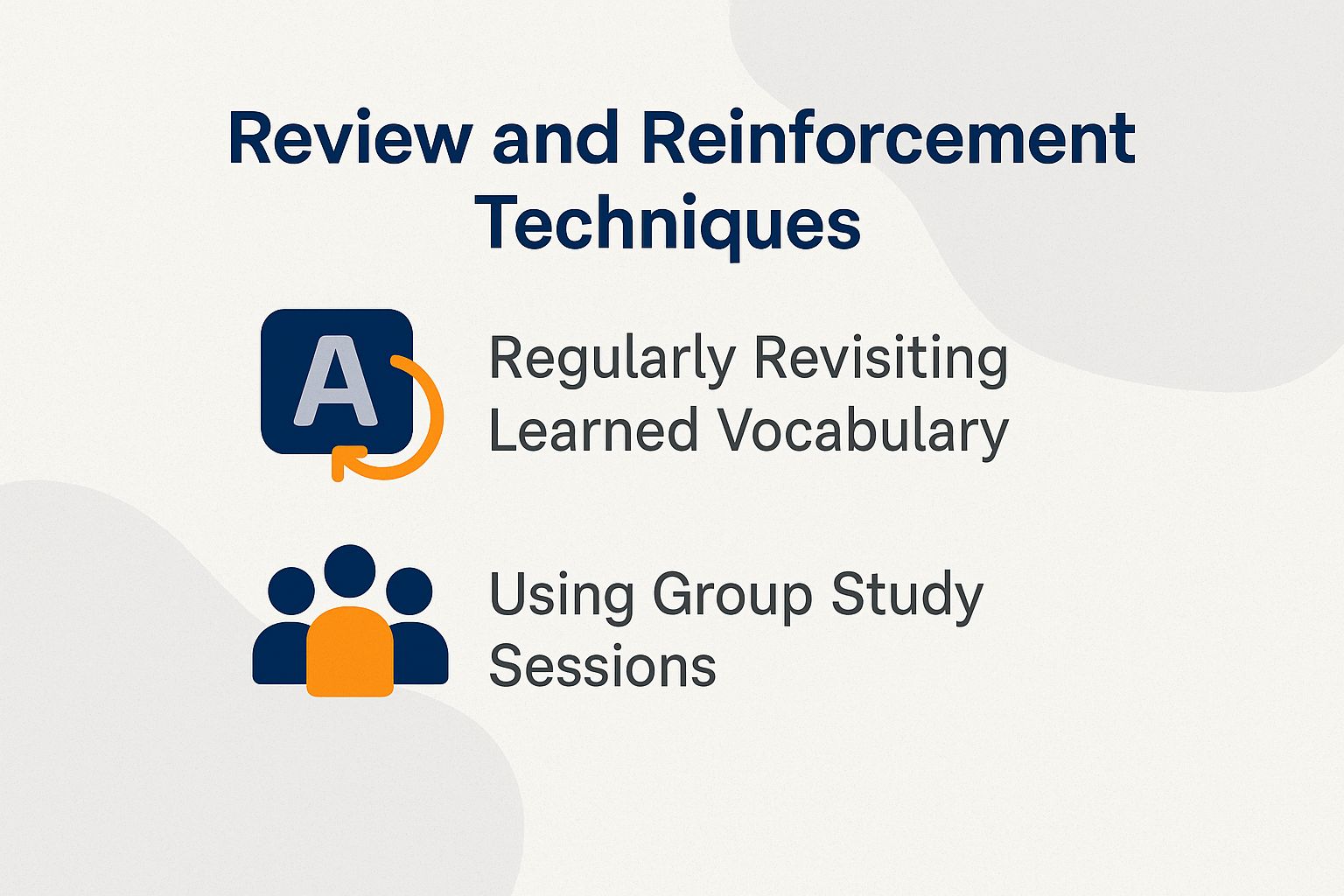
Regularly reviewing and reinforcing techniques is essential for solidifying vocabulary and spelling knowledge in preparation for the 11 Plus examination.
Consistent practice can greatly enhance a student’s confidence and competence in these areas.
Regularly Revisiting Learned Vocabulary
Incorporating regular reviews of vocabulary is essential for ensuring long-term retention and readiness for the 11 Plus exam. To enhance vocabulary retention, there are several effective strategies one might consider.
For example, scheduling weekly quizzes can be an excellent way to test understanding and reinforce memory. Utilising flashcard apps such as Anki or Quizlet can also be highly beneficial, as they allow for the creation of custom decks that target challenging words.
Additionally, grouping words by theme—such as synonyms or antonyms—can help deepen connections and improve recall.
It’s advisable to aim for short, focused study sessions of around 20 to 30 minutes to maintain concentration and enthusiasm. Consistency is crucial, so integrating these reviews into a regular study routine will yield the best results.
Using Group Study Sessions
Group study sessions have the potential to significantly enhance learning outcomes through collaborative engagement and peer feedback focused on vocabulary and spelling.
To ensure that these sessions are as effective as possible, it is beneficial to structure each one around specific activities.
- Begin with a brief review of vocabulary words, allowing each participant to share their understanding of a select number of terms.
- Following this, incorporate spelling drills using tools such as Quizlet or Kahoot to create an interactive learning environment.
- After the drills, practice writing sentences that incorporate the new vocabulary, encouraging constructive feedback from peers to refine usage.
- It is also important to allocate time for group discussions centred around challenging words, as this fosters a deeper understanding through diverse perspectives.
This structured approach not only promotes accountability among group members but also strengthens retention of the material.
Frequently Asked Questions
What is the 11 Plus Vocabulary and Spelling exam?
The 11 Plus Vocabulary and Spelling exam is a standardised test that assesses a student’s mastery of vocabulary and spelling at a high school level. It is commonly used as an entrance exam for selective schools in the UK.
When should I start preparing for the 11 Plus Vocabulary and Spelling exam?
It is recommended to start preparing for the 11 Plus Vocabulary and Spelling exam at least 6 to 12 months before the exam date. This will give you enough time to build a strong foundation of vocabulary and spelling skills.
What are some effective study strategies for the 11 Plus Vocabulary and Spelling exam?
Some effective study strategies for the 11 Plus Vocabulary and Spelling exam include creating flashcards, practising with online quizzes and games, reading regularly, and using context clues to decipher unfamiliar words.
How can I improve my vocabulary and spelling skills for the 11 Plus exam?
To improve your vocabulary and spelling skills for the 11 Plus exam, you can read a variety of books, newspapers, and magazines to expose yourself to new words. It is also helpful to practice spelling words out loud, using mnemonic devices, and participating in spelling bees.
What resources are available for preparing for the 11 Plus Vocabulary and Spelling exam?
There are various resources available for preparing for the 11 Plus Vocabulary and Spelling exam, including practice books, online courses, tutoring services, and study groups. You can also access free resources such as vocabulary lists and spelling games on educational websites.
How important is it to practice past papers for the 11 Plus Vocabulary and Spelling exam?
Practising past papers is crucial for the 11 Plus Vocabulary and Spelling exam as it helps you become familiar with the format and types of questions asked. It also allows you to identify your strengths and weaknesses, enabling you to focus on areas that need improvement.


